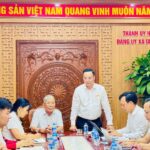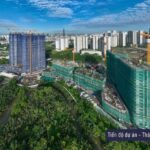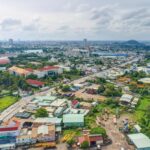“Real Estate Renaissance: Navigating Vietnam’s Property Market Opportunities”
The real estate market is witnessing a robust recovery in early 2025, fueled by groundbreaking policies, relaxed credit conditions, legal obstacle removal, and significant FDI inflows into Vietnam. According to CBRE, apartment prices in Hanoi surged by an impressive 36%, reflecting strong demand and a distinct market recovery cycle. New projects commencing construction are supplying over 30,000 apartments, mainly in the North.
In parallel, robust FDI inflows into manufacturing are driving robust demand for industrial land leases. By 2027, Vietnam is projected to require an additional 15,200 ha of industrial land and 6 million square meters of warehouses. Amidst this landscape, what are the optimal strategies for investors, and are there still opportunities for small investors to make a breakthrough?
In the program “Cafe Sang cung HANOIBA” (Hanoi Young Business Association) with the theme “Real Estate or Real Estate!”, Mr. Nguyen Trung Vu, Chairman of Cen Group, shared his insights on this issue.
According to Mr. Vu, the leadership of the Party and the State recognize the significant but unsustainable revenue source from land. He stated: “The leadership of the Party and the State consider revenue from land a significant but unsustainable source. With the development of large-scale urban areas of 1,000, 2,000, or 5,000 hectares, these areas will soon be populated. People are currently living in rural villages or areas lacking adequate infrastructure, but with this development pace, they will soon move to regions with better infrastructure.”
He argued that the policy of annual land rent, especially for prime locations, reflects a long-term vision: “There are many habitable lands, but annual rent is required, especially for prime locations. The State will also determine to collect annual rent for beautiful beachfront properties in Nha Trang, Da Nang, and Hoi An. Typically, the State collects rent annually or every 50 years with an option to renew. If we collect a one-time payment, what will be left for our children and grandchildren? Thus, the State has demonstrated its far-sightedness.”
Addressing concerns about the Vietnamese real estate market potentially falling into the same trap as China’s with giants like Evergrande and Country Garden, Mr. Vu disagreed: “Regarding the notion that the real estate market poses more dangers than opportunities and will follow China’s path, there is no similarity. If we refer to companies like Country Garden or Evergrande, there is no correlation.
Remember that from 1998 to 2019, China experienced continuous double-digit growth. Country Garden and Evergrande thrived and created a buzz during that period. In contrast, we are just entering 2025, hoping for 8% growth and aspiring to achieve double-digit growth in the coming years. Our businesses are currently receiving significant support from the Party and the State, and we have only about 20 years left to become an industrialized country with high income, escaping the middle-income trap. This is entirely different from China.”

Mr. Vu emphasized that Vietnam has entered a new era, having learned from its neighbor’s experiences, and only the most capable businesses will remain after this challenging period.
“With our approach in this new era, we have a softer landing and have witnessed our neighbor’s issues. Moreover, our businesses surviving the COVID-19 pandemic and economic hardships are genuinely exceptional. Therefore, I believe there is no need to worry about Evergrande; Vietnam is on a different path,” asserted the Chairman of Cen Group.
While acknowledging the abundant opportunities in the market, Mr. Vu also warned of intensifying competition: “However, one thing is certain: it will be extremely challenging for amateurs to enter the real estate market in the coming period. I can assure you that the market has reached a stage where only the most skilled and knowledgeable players will compete.”
To illustrate his point, he provided examples from two of Vietnam’s leading conglomerates: “Sun Group has a very catchy slogan, ‘Beautifying Destinations,’ implying that wherever they go, they will enhance the area’s beauty. This approach emphasizes aesthetics, exceptional service quality, and customer satisfaction. On the other hand, Vingroup’s slogan, ‘One Destination, Million Joys,’ conveys the idea that their destinations offer a diverse range of amenities, including shopping malls, hospitals, and schools. Can you compete with them? If not, you should opt out.”
Therefore, for small investors, Mr. Vu recommended exploring niche markets that align with their strengths to gain a competitive edge.
A Proposal to Reduce Land Use Fees for Residential Purposes
HoREA has proposed that in the event of a Government Resolution, the collection of land use fees when converting agricultural or non-agricultural land to residential land should be clearly specified. They suggest a reduction from 30% to 20% for land within the allocated residential land limit, and from 50% to 30% for land exceeding this limit.
What’s So Special About This Delayed Urban Area From 2008 That Real Estate Tycoon Le Thanh Than Wants to Revive?
“During a meeting with the Muong Thanh Group, the leaders of Tam Hung Commune expressed their willingness to facilitate the company’s efforts in developing the My Hung Urban Area project. They assured the group of their full support and commitment to creating favorable conditions for the project’s swift implementation and operation.”











































